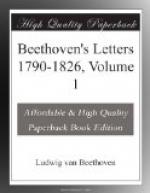Your friend,
BEETHOVEN.
If the Opera is to be performed the day after to-morrow, there must be another private rehearsal to-morrow, or each time it will be given worse and worse.
[Footnote 1: Meyer, the husband of Mozart’s eldest sister-in-law, Josepha (Hofer’s widow), sang the part of Pizarro at the first performance of Fidelio, Nov. 20, 1805, and also at a later period. Seyfried was at that time Kapellmeister at the Theatre “an der Wien.”]
42.
TESTIMONIAL FOR C. CZERNY.
Vienna, Dec. 7, 1805.
I, the undersigned, am glad to bear testimony to young Carl Czerny having made the most extraordinary progress on the pianoforte, far beyond what might be expected at the age of fourteen. I consider him deserving of all possible assistance, not only from what I have already referred to, but from his astonishing memory, and more especially from his parents having spent all their means in cultivating the talent of their promising son.
LUDWIG VAN BEETHOVEN.
43.
TO HERR ROeCKEL.[1]
DEAR ROeCKEL,—
Be sure that you arrange matters properly with Mdlle. Milder, and say to her previously from me, that I hope she will not sing anywhere else. I intend to call on her to-morrow, to kiss the hem of her garment. Do not also forget Marconi, and forgive me for giving you so much trouble.
Yours wholly,
BEETHOVEN.
[Footnote 1: Roeckel, in 1806 tenor at the Theatre “an der Wien,” sang the part of Florestan in the spring of that year, when Fidelio was revived. Mdlle. Milder, afterwards Mdme. Hauptmann, played Leonore; Mdme. Marconi was also prima donna.]
44.
TO HERR COLLIN,[1] COURT SECRETARY AND POET.
MY ESTEEMED COLLIN,—
I hear that you are about to fulfil my greatest wish and your own purpose. Much as I desire to express my delight to you in person, I cannot find time to do so, having so much to occupy me. Pray do not then ascribe this to any want of proper attention towards you. I send you the “Armida”; as soon as you have entirely done with it, pray return it, as it does not belong to me. I am, with sincere esteem,
Yours,
BEETHOVEN.
[Footnote 1: Collin, Court Secretary, was the author of Coriolanus, a tragedy for which Beethoven in 1807 wrote the celebrated Overture dedicated to that poet. According to Reichardt, Collin offered the libretto of Bradamante to Beethoven in 1808, which Reichardt subsequently composed. This note evidently refers to a libretto.]
45.
TO HERR GLEICHENSTEIN.[1]
I should like very much, my good Gleichenstein, to speak to you this forenoon between one and two o’clock, or in the afternoon, and where you please. To-day I am too busy to call early enough to find you at home. Give me an answer, and don’t forget to appoint the place for us to meet. Farewell, and continue your regard for your




